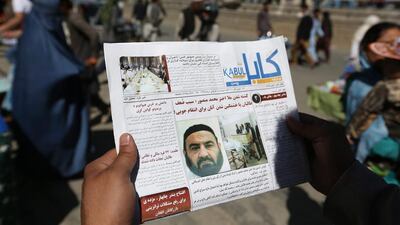KABUL // After the United States killed the leader of the Afghan Taliban in a drone strike earlier this month, it accused him of rejecting the chance for peace talks and dragging his country deeper into war.
But Afghans who knew Mullah Akhtar Mansour have told The National that the details of his life and potential consequences of his death are far more nuanced than officials in Washington and Kabul would have the world believe.
While the Taliban carried out a number of high-profile attacks under Mullah Mansour’s leadership, people who met him long before he rose to notoriety spoke of a man who seemed just as at ease dealing with administrative paperwork as he was in coping with the blood and guts of the battlefield.
His death, they said, simply marked the end of one chapter in the insurgency. An even more violent chapter may be about to begin, they warned.
“The Taliban are experienced men now. They know very well what to do and what not to do,” said Abdul Malik Himmat, a Kabul-based author and religious scholar. “The old cadres are dead but the new cadres are also very knowledgeable.”
When the Taliban ruled over much of Afghanistan in the late 1990s, Mullah Mansour was minister of aviation with an office at Kandahar airport. It was during this period that Mr Himmat used to see him regularly, wandering around the terminal in a black turban, completely at ease in his surroundings as he chatted to anyone who approached.
“He didn’t consider himself better than the rest of us,” he recalled.
Back then, Mr Himmat had a business importing medicine from India using planes from Ariana, the Afghan national airline. Two or three times a week he would need Mullah Mansour’s help with paperwork and mundane bureaucratic matters that some senior officials might have considered below their station.
Mr Himmat found him to be highly intelligent, friendly and able to speak fluent Arabic with visitors who arrived in the city from Dubai. “He was a good fighter and a good manager,” he said.
Mullah Mansour was killed in a US drone strike as he travelled through the southwestern Pakistani province of Balochistan on May 21. Photographs of his body and the burnt wreckage of his vehicle appeared in the media soon afterwards.
US president Barack Obama hailed his death as “an important milestone” and urged the Taliban to take part in peace talks. The Afghan government, meanwhile, claimed the former aviation minister had been the main obstacle to meaningful negotiations.
Mullah Mansour became the insurgents’ leader after the Taliban finally confirmed the death of his predecessor, Mullah Mohammed Omar, last summer – more than two years after he died in a Pakistani hospital.
Weeks of internal discord followed as factions within the movement voiced their anger at the cover-up and their opposition to the succession process.
But even as the infighting continued, the Taliban made rapid progress on the battlefield, most notably capturing the northern city of Kunduz for two weeks last September and October.
Afghans who knew Mullah Mansour credit him with instilling a new sense of purpose and order within the movement’s ranks after the shaky start to his tenure. They also dismiss the idea that he was against peace talks.
Waheed Mozhdah worked as an official in the foreign ministry during the Taliban regime. He told The National Mullah Mansour had shown a willingness to compromise even then by continuing to employ officials from previous governments, including his deputy minister, when others in the Taliban may have preferred to seek retribution.
More recently, Mr Mozhdah said, the Taliban’s decision to open a political office in Qatar in 2013 and to engage in informal talks organised by the Pugwash Conferences on Science and World Affairs was largely the work of Mullah Mansour.
“Even at a time when some extremists around him were saying that peace and negotiations will damage the movement and weaken the jihad, he had the power to make them aware of the benefits,” said Mr Mozhdah.
Last week the Taliban announced that the movement’s new leader is Mawlawi Hibatullah Akhundzada, a scholar and one of Mullah Mansour’s deputies. A son of Mullah Omar will now serve as Mawlawi Akhundzada’s second-in-command alongside Sirajuddin Haqqani, who held the same position before and is head of arguably the most feared branch of the insurgency.
Mr Mozhdah described the new leadership structure as “very strategic” and “well thought out” as the deputies come from prominent militant families in both southern and eastern Afghanistan, where the Taliban find most of their support. He predicted it would signal a shift further away from negotiations, towards an even more extreme approach.
In April dozens of people were killed and hundreds injured when the Taliban attacked the headquarters of an elite Afghan military unit in Kabul. The government reacted furiously, executing six Taliban prisoners.
The cycle of violence continued on Wednesday when the Taliban responded with a suicide bombing targeting a minibus carrying court employees on the outskirts of Kabul. At least 10 people were killed.
Mohammed Hassan Haqyar, a political analyst and former deputy minister of mines in the Taliban regime, predicted the war will intensify in the weeks and months ahead.
Mullah Mansour’s death “will not benefit Afghanistan”, he said, because it will simply encourage the Taliban to demonstrate their strength by fighting even harder.
Soon after he spoke to The National, Mr Haqyar was arrested by the Afghan intelligence service for publicly referring to Mullah Mansour as a "martyr". He has since been released.
foreign.desk@thenational.ae
* Chris Sands contributed to this story from the UK

